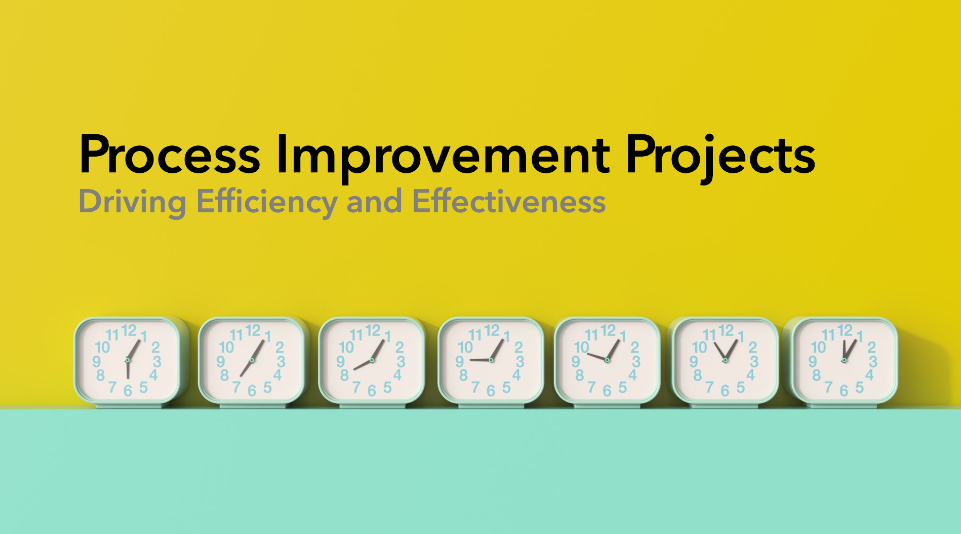
Introduction
Process improvement projects are essential initiatives within organizations that aim to enhance the efficiency, effectiveness, and quality of existing processes. By systematically evaluating and refining processes, organizations can reduce waste, lower costs, and improve customer satisfaction. These projects often utilize methodologies like Lean, Six Sigma, and Total Quality Management (TQM) to achieve their goals. In this article, we’ll explore the importance of process improvement projects and how Business Transformation Consulting as a Service (BTCaaS) can facilitate successful implementation.
Importance of Process Improvement Projects
- Enhanced Efficiency Streamlining processes helps eliminate redundancies and bottlenecks, leading to faster turnaround times and improved productivity. Efficient processes allow organizations to deliver products and services more quickly, providing a competitive edge.
- Cost Reduction By identifying and eliminating wasteful activities, organizations can significantly reduce operational costs. This can lead to increased profitability and the ability to reinvest savings into further improvements or innovations.
- Improved Quality Process improvement projects focus on enhancing the quality of products and services. By implementing standardized procedures and continuous monitoring, organizations can reduce errors and defects, resulting in higher customer satisfaction.
- Increased Customer Satisfaction Streamlined processes and higher quality lead to better customer experiences. Satisfied customers are more likely to become repeat buyers and advocates for the organization, driving revenue growth.
- Employee Engagement Involving employees in process improvement projects can boost morale and engagement. When team members have a voice in optimizing their workflows, they feel valued and invested in the organization’s success.
Common Methodologies for Process Improvement
Several methodologies are commonly employed in process improvement projects:
- Lean Lean focuses on maximizing customer value while minimizing waste. This methodology emphasizes the elimination of non-value-added activities and seeks to create more efficient workflows.
- Six Sigma Six Sigma is a data-driven approach that aims to reduce variation and defects in processes. By using statistical analysis and rigorous problem-solving techniques, organizations can achieve near-perfect quality.
- Total Quality Management (TQM) TQM is a holistic approach that integrates all members of an organization in improving processes, products, and services. It emphasizes continuous improvement and customer satisfaction as central goals.
- Kaizen Kaizen is a Japanese term meaning “continuous improvement.” This philosophy encourages ongoing, incremental improvements involving all employees at every level of the organization.
Steps in Implementing Process Improvement Projects
To successfully implement process improvement projects, organizations can follow these steps:
- Identify the Process to Improve Start by selecting a specific process that requires improvement. This could be based on customer feedback, employee input, or performance metrics.
- Analyze the Current Process Conduct a thorough analysis of the existing process. Use tools like flowcharts, process mapping, and root cause analysis to understand how the process currently operates.
- Define Improvement Goals Set clear, measurable objectives for the improvement project. These could include reducing cycle times, improving quality metrics, or decreasing costs.
- Develop and Implement Solutions Brainstorm potential solutions to address the identified issues. Choose the most effective solutions and implement them in a controlled manner, ensuring that all stakeholders are involved.
- Monitor and Measure Results After implementing the changes, closely monitor the process to evaluate the impact. Use key performance indicators (KPIs) to measure progress against the defined goals.
- Standardize Successful Changes If the improvements yield positive results, standardize the changes across the organization to ensure consistent application and long-term benefits.
- Foster a Culture of Continuous Improvement Encourage an ongoing commitment to process improvement by fostering a culture that embraces change and innovation.
Challenges in Process Improvement Projects
While process improvement projects can yield significant benefits, organizations may encounter challenges, including:
- Resistance to Change: Employees may resist changes to established processes, fearing disruption or uncertainty.
- Insufficient Data: Lack of accurate data can hinder the ability to analyze processes effectively and make informed decisions.
- Limited Resources: Process improvement initiatives may require time, financial investment, and skilled personnel that organizations may struggle to allocate.
- Lack of Leadership Support: Without strong backing from leadership, process improvement projects may lack the necessary resources and urgency.
How Business Transformation Consulting as a Service (BTCaaS) Can Help
Business Transformation Consulting as a Service (BTCaaS) offers a suite of services designed to support organizations in their process improvement efforts. Here’s how BTCaaS can enhance process improvement projects:
- Expert Guidance and Support BTCaaS consultants bring extensive experience in process improvement methodologies. They can provide expert guidance in selecting the most appropriate approach for your organization’s specific needs.
- Data Analysis and Insights Utilizing advanced analytics tools, BTCaaS can help organizations gather and analyze data related to their processes. This data-driven approach enables informed decision-making and targeted improvements.
- Change Management Expertise BTCaaS specializes in change management strategies that address employee resistance and promote buy-in. They can facilitate training sessions and workshops to engage employees and foster a culture of continuous improvement.
- Tailored Solutions BTCaaS works closely with organizations to develop customized process improvement solutions. By understanding the unique challenges and goals of each organization, they can create targeted strategies that drive meaningful results.
- Performance Monitoring Post-implementation, BTCaaS can assist in establishing performance monitoring systems to track progress against improvement goals. Regular check-ins ensure that organizations stay on course and can adjust strategies as needed.
- Long-term Sustainability BTCaaS emphasizes the importance of sustaining process improvements over time. They help organizations establish processes for continuous assessment and adaptation, ensuring that gains are maintained and further enhanced.
Conclusion
Process improvement projects are vital for organizations seeking to enhance efficiency, reduce costs, and improve customer satisfaction. By leveraging methodologies like Lean, Six Sigma, and TQM, businesses can systematically refine their processes and achieve significant benefits. Business Transformation Consulting as a Service (BTCaaS) offers the expertise and support necessary to drive successful process improvement initiatives. With a focus on tailored solutions, data analysis, change management, and long-term sustainability, BTCaaS empowers organizations to transform their processes and thrive in an ever-evolving business landscape.
